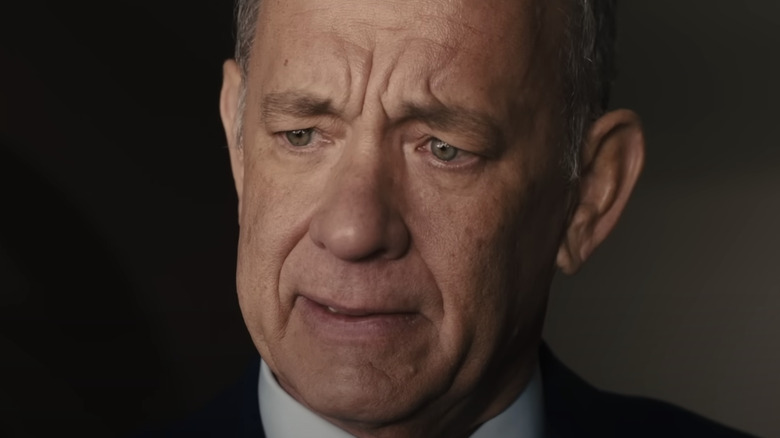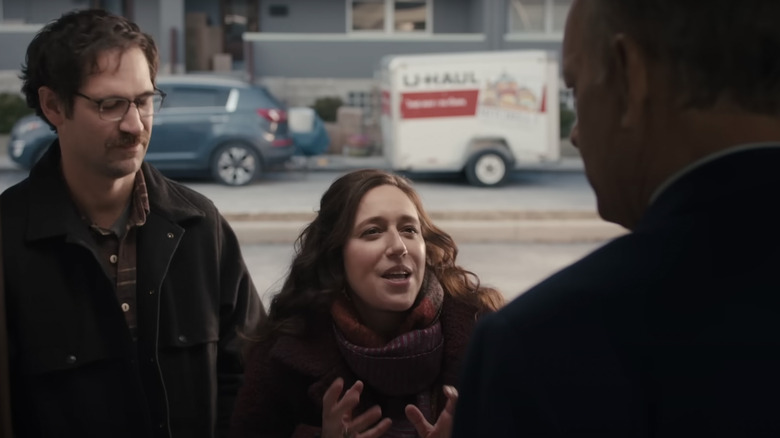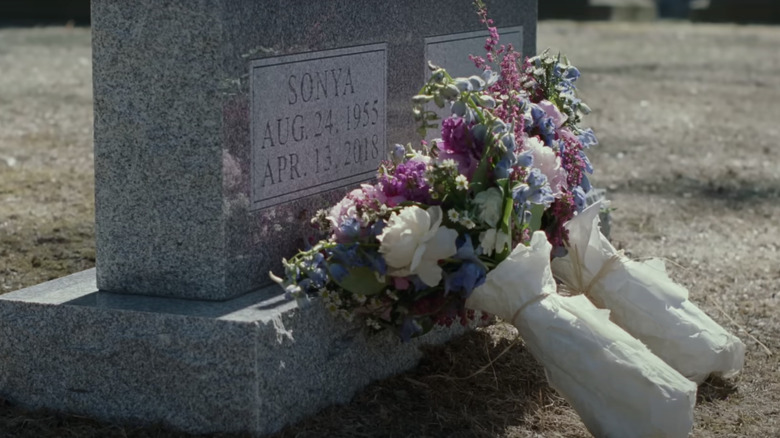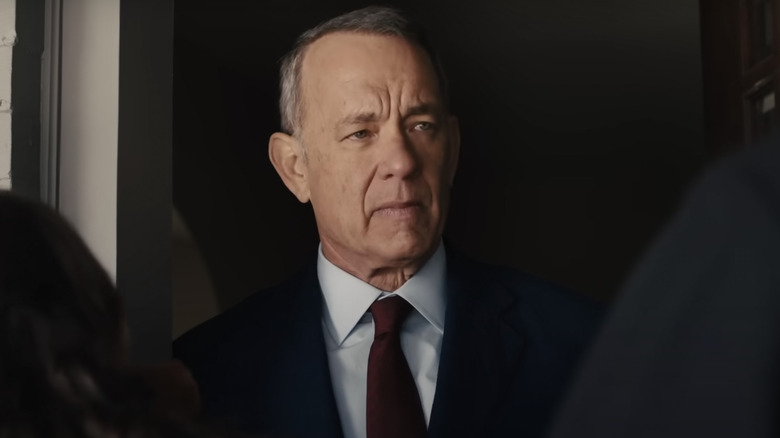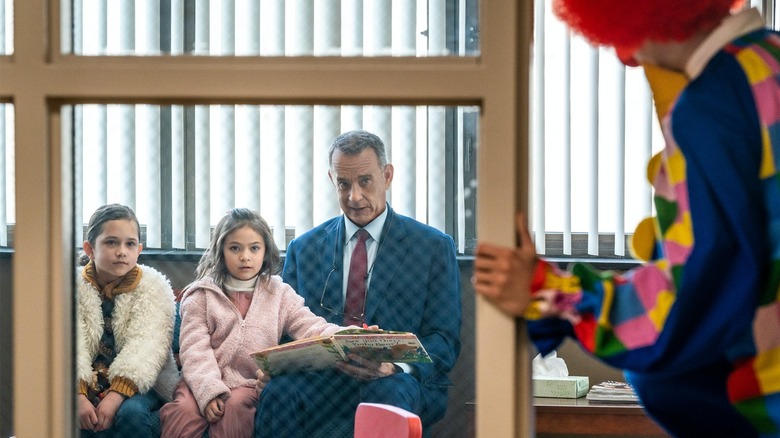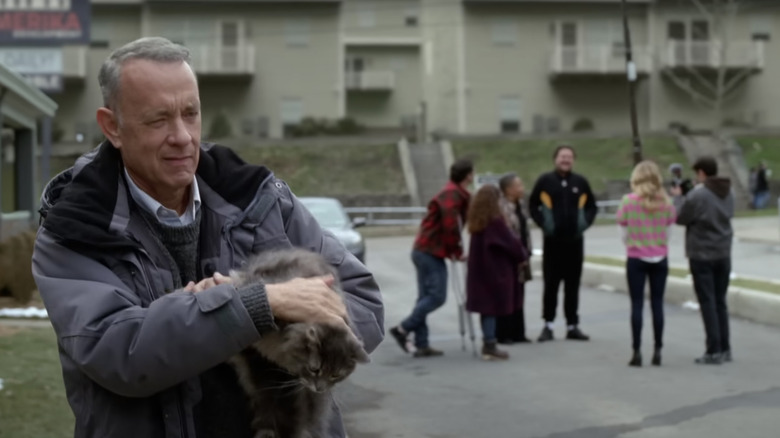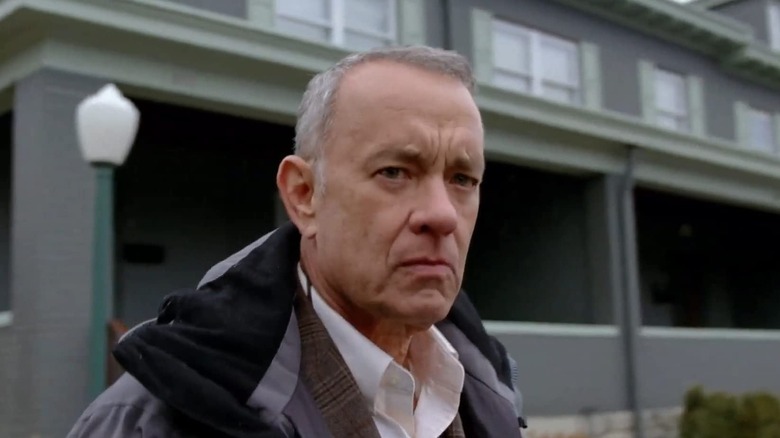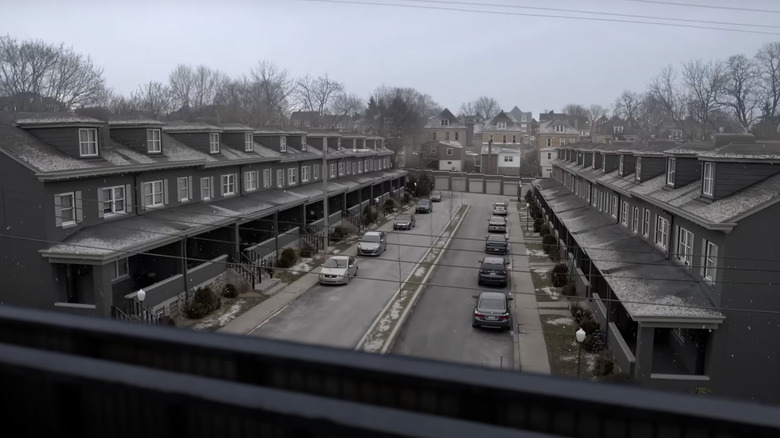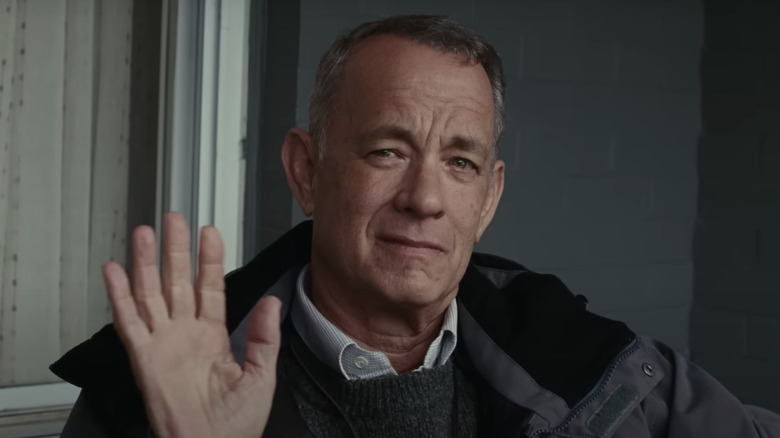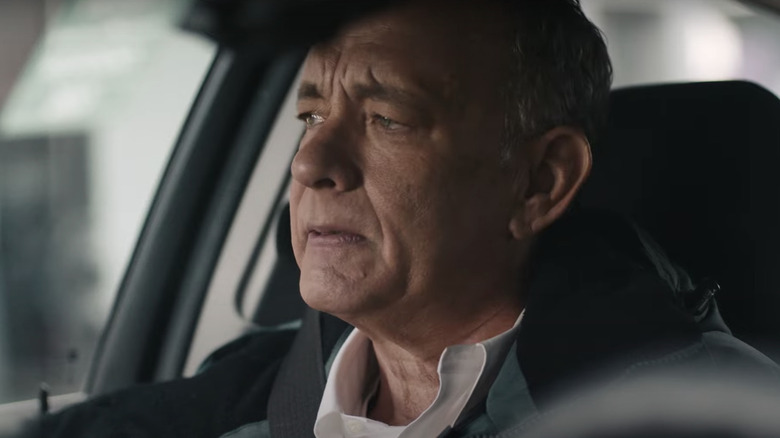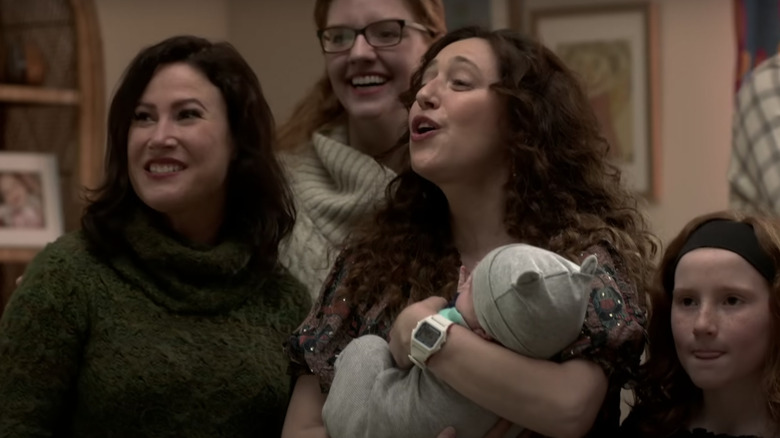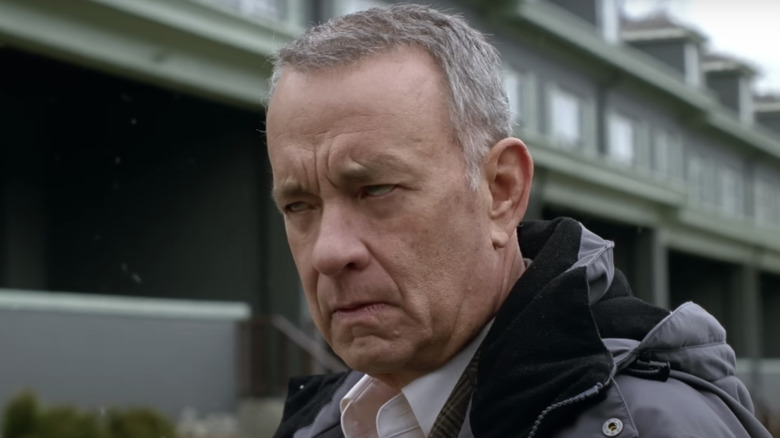The Ending Of A Man Called Otto Explained
More than a decade ago, Swedish writer Fredrik Backman began writing blog posts in character as a grumpy sexagenarian (per The New York Times). He'd read a news story about a man who'd acted poorly in public and recognized the type. Realizing that there was a story there and an audience for it, Backman penned "A Man Called Ove," which was published in 2012 and adapted into a film of the same name in 2015.
The American remake, which swaps the name Ove for Otto, boasts quite a pedigree. It's directed by Marc Forster, who's headed up a diverse slate of films that includes "Monsters Ball," "Finding Neverland," "World War Z," and the James Bond film "Quantum of Solace." The screenplay was written by David Magee, who reimagined the supposedly un-filmable "Life of Pi" for the screen, as well as "Finding Neverland" and this year's "Lady Chatterly's Lover." And in the lead role of the curmudgeonly Otto Anderson? Tom Hanks.
The notoriously affable Hanks, who's often thought of as America's Dad, might not be the first name that comes to mind when one thinks about a seemingly one-note (read: cranky) character like Otto. However, both Otto and the film about him are more tragically comedic than one might expect from the trailer, thanks to the way Hanks interacts with the large supporting cast. Predictably, Otto learns his lesson in the end and is a changed man. Still, the way the disparate subplots tie together is somewhat surprising, as the truth about Otto is revealed in flashbacks and present-day confessions.
This article contains discussions of suicide. If you or anyone you know is having suicidal thoughts, please call the National Suicide Prevention Lifeline by dialing 988 or by calling 1-800-273-TALK (8255).
Why's Otto So Unfriendly?
After Otto helps them parallel park their trailer, Marisol (Mariana Treviño) and Tommy (Manuel Garcia-Rulfo) walk over to properly introduce themselves. Otto is so short with his new neighbors that Marisol asks him, "Are you always this unfriendly?" He is, at least on the surface, though his actions bely his gruff persona.
Why, exactly, Otto is a grouch is basically the premise of the movie. When we see him in flashback (played by Hanks' real-life son Truman), Otto is a wide-eyed, love-struck dork, albeit one who's been affected by loss. His mother died when he was a small child and he lost his father — with whom he was very close and who taught him his trade — during his late teen years.
The film gives plenty of reasons for Otto's short temper. He's a stickler for rules and norms, and he's incensed at how few people seem to abide by them. He believes in fairness and a hard day's work, and is feeling purposeless when he's all but forced to retire from his job at a manufacturing plant. Otto also feels threatened by the younger generation and the changing world around him. The twenty-something he trained has been hired to replace him. It's not just that he doesn't understand the many ways in which society is modernizing, from hybrid cars to social media journalists. He increasingly feels as though there isn't a place for people like him in the world anymore, especially since he's lost the love of his life, Sonya.
What happened to his wife?
We know early on that Sonya (Rachel Keller) died prior to the events of the movie, but we don't get many details until much later in the runtime. We see Otto and Sonja's meet cute, their first date, his graduation and proposal, and their move into the condo complex all in flashback. Over Swedish eclairs, Marisol asks Otto about his low countertops and inquires about whether they'd wanted children. It isn't until we see Otto's memories of their babymoon to Niagara Falls that we understand the root of his chronic anger.
On the ride back to Pittsburgh, their tour bus crashed while he was in the lavatory. A pregnant Sonya barely survived and was paralyzed from the waist down, losing the baby. After a three-month recovery, Sonya was able to come home. Though she was heartbroken that she and Otto — who she said would make an ideal father — wouldn't be able to have kids, she was able to move on. Otto, however, discovered the crash was caused by a recalled brake which the busing company failed to fix. The accident, his wife's loss of mobility, and his son's death were all preventable, and Otto couldn't get over the fact that corporate criminal negligence cost him his blissful future.
To make matters worse, the Andersons continued to run into hurdles because disability laws hadn't yet been enacted, making life even harder and less fair for Sonya. Otto promised his wife he would put the past behind him, but after her death from cancer six months before the movie takes place, it's clear he's never really been able to.
What's Otto's plan?
When we meet Otto, he's buying precisely five feet of rope from a hardware store and arguing with a teenage cashier over the pricing structure. It turns out, Otto's planning to use that rope to hang himself so that he can join his late wife in whatever kind of afterlife he imagines. Ever a craftsman, Otto painstakingly attaches his noose to the ceiling with the proper tools. When the drywall and hardware give way, Otto bemoans the poor quality of construction materials nowadays.
Otto attempts suicide three more times. He poisons himself with the exhaust from his Chevy, jumps in front of a train, and aims his rifle at his chin. Each time, he has hallucinatory visions of Sonya, and each time, he's interrupted by a neighbor or passerby. Marisol and Tommy come knocking to give him chicken con mole, then Marisol needs Otto to give her a ride to the hospital after Tommy falls from the ladder he borrowed. He rescues an elderly man who tumbles onto the tracks while everybody else just records the incident on their phones, and he lets Malcolm (Mack Bayda) spend the night rather than pull the trigger. These interruptions are plot conveniences, but they do show how many people Otto has in his life.
Less obvious is the meaning behind his hazy memories of Sonya. His troubled soul is soothed as he relives his time with her, but she's definitely not calling him to the other side. It's possible that Otto can't quite go through with it because deep down, he knows it's not what Sonya would want.
Why does he help Marisol and her family?
Though Otto's neighborhood is full of colorful characters, the catalyst for change is Marisol. Otto thinks Tommy's a "nitwit husband" (though he does have some begrudging affection for him), but he takes to Marisol and the girls pretty quickly. It's obvious that he appreciates Marisol's cooking — which he calls "interesting" — more than he lets on. He offers to teach her to drive, ostensibly because his athleisure-wearing neighbor is doing it wrong. But really, Otto just can't help helping people. His problem is that he's terrible at accepting help in return.
Otto eventually becomes so close to Marisol that he lists her as his next of kin at the emergency room. Why does a suicidal, bitter loner befriend a chipper, pregnant Mexican immigrant? Because she reminds him of his late wife. According to her friends, Sonya was the opposite of Otto in almost every way. While she loved books, he couldn't get into them. She was free-spirited, creative, and forgiving. He's rigid, practical, and prone to holding a grudge. Sonya believed in him at his lowest moment, after his father's death when he failed his army physical and didn't have an education or any job prospects, but she also held him to account.
Marisol is as bold, kind, and generous as Sonya. She pressures Otto to fix Anita's radiator and repair his relationship with Reuben. And while babysitting Abby and Luna, Otto notices Marisol's degrees, including a masters in literature. In a completely platonic way, Marisol fills at least a part of the void left by Sonya. She helps him realize he needs help, too.
How does meeting Malcolm change his perspective?
Near the beginning of the film, Otto barks at the young man who delivers rolled-up store ads and leaves his bike unattended despite the rack nearby. He tells him to get a real job, to which the young man replies he has two more real jobs and is saving up to buy a car. That young man later introduces himself as Malcolm, one of Sonya's former students. Previously, we'd learned that, after her accident and miscarriage, Sonya found contentment and purpose by dedicating herself to teaching social and emotional health (and Shakespeare) to kids with various underserved needs. Malcolm tells Otto that he's transgender and Sonya played an instrumental role in his life. He promises Otto he won't litter his lawn with ads anymore.
Instead, Otto takes Malcolm under his wing. He introduces him to the rest of the neighborhood, lets him stay in Sonya's study when his father kicks him out, and teaches him all the things he would've taught his own son, had he not been lost in the crash. That Otto's nonchalantly fully accepting of Malcolm shows he's not your average old-fashioned grump. But just as importantly, Malcolm's presence forces Otto to consider what he really loved about his wife: not just that she was there and that she loved him, but that she was a universal force for good. Just as she was the color in his black and white world, she was the color in Malcolm's world when he needed it most. Otto decides to bequeath his Chevy Cruze to Malcolm once he learns how to take care of it, then buys himself a new truck.
What was the coup?
There's a minor mystery lingering in the background of "A Man Called Otto." He and Sonya had once been best friends with another young couple at the condo complex, Anita and Reuben. But at some point, the husbands had a falling out. The film tricks us into thinking it was a petty disagreement that had to do with auto manufacturers. Otto's a Chevy man. Reuben's a Ford guy — that is, until he shows Otto (who is, at minimum, a Made in America consumer) the Toyota in his garage. But really, their feud stems from something much more serious.
After her extensive injuries, Sonya required the use of a wheelchair. However, their property wasn't constructed to be wheelchair accessible. There weren't ramps on the sidewalks or into the front doors, and the doors weren't wide enough for the wheelchair to pass through. The highly regimented and observant Otto had been the president of the homeowners' association, a position he seems well-suited for as a Jack-of-all-trades who enjoys making "his rounds" to ensure that everything on the street is shipshape.
But after the accident, when Otto began pushing for change to be made to accommodate Sonya, the real estate developers brushed him off. There were no laws that required construction projects to incorporate the modifications that Otto was demanding. When he lost his temper at a meeting, his neighbors voted to remove him from his post and replace him with Reuben. This only added to Otto's notion that the world was against him, as he felt his community had turned its back on his wife.
Who was the real enemy?
Though we're meant to see Otto as his own antagonist, there's another villain lurking around the condo complex throughout. Otto bursts out in fury every time he spies a Dye & Merika representative (played by an against-type Mike Birbiglia). Early on, we're led to believe that it's because, though they're the real estate developers and agents, they don't follow the posted rules. For example, they leave the gates open and park without permits. In time, Otto opens up to Marisol about how they built units so quickly and cheaply, they razed the very forests after which the development was named. He also obviously resents how they treated him and Sonya when he'd petitioned for renovations. But Dye & Merika's villainy goes much deeper than shoddy construction, poor timber management, and their beef with a relentless Otto Anderson.
Viewers may have noticed myriad similarities between "A Man Called Otto" and Pixar's "Up." Both flash back to the past and involve a couple who couldn't have children. Both start in earnest after the fun-loving wife dies and the malcontent husband makes new friends and adopts new pets against his will. And both involve a shady company that's trying to remove the elderly from their homes. In this case, Dye & Merika has been keeping files on its residents, in particular those who own their homes outright. While Tommy and Marisol are renting, Otto, Anita, and Reuben stand in the way of new and more expensive construction. The company is currently using those records to strongarm Anita and Reuben into leaving for assisted living.
How does Otto redeem himself?
After Otto's last suicide attempt scares Marisol, he tries to set things right in the smallest way possible, by telling her why he needs to use her phone. Dye & Merika has convinced Anita and Reuben's estranged son, Chris, who has power of attorney, to agree to have them removed under the pretense that they can no longer take care of themselves. The real estate company knows that Anita has been diagnosed with Parkinson's. Earlier, the agent threatened Otto with knowledge of his heart condition. Otto confronts Anita, who says she kept her condition a secret because he and Sonya had enough going on with her cancer. He realizes that Dye & Merika must be obtaining medical records illegally and hatches a plan to stop them.
Otto contacts the social media journalist who had wanted to interview him after the video of him saving the man's life on the train tracks went viral. He teams her up with Malcolm, who operates the camera. Friendly power walker Jimmy and Marisol's family come outside to take cell phone footage and lend support. The journalist live streams herself asking how Chris, who lives in Japan and hasn't seen his parents in ten years, could possibly know whether they were fit to live independently. The bad press from the encounter scares off the developers, and Reuben smiles at Otto, thankful that he used his newfound internet clout in such a way. Otto had wanted to isolated himself from his community and even escape his life, but by bringing everyone together around a just cause, he healed several wounds, old and new.
What does Otto mean by idiot?
Otto mutters the word "idiot" many, many times throughout the course of the film, mostly to himself but sometimes straight to characters' faces. On a surface level, he's constantly irritated by people's shortcomings, but a closer inspection reveals that there isn't much rhyme or reason to what bothers him. For example, he's annoyed that Tommy can't fix things around the house (and that he thinks it's called an Alvin wrench), but in practice, he tells Malcolm that his dad's an idiot for expecting him to conform to traditional gender standards. When Marisol struggles to drive stick and loses confidence, he pumps her back up by telling her that she's not an idiot, which is as nice a compliment as he's likely to give anyone.
It's true that Otto looks down on people who don't have his skills and what he thinks of as common sense, but Otto's anger is a defense mechanism more than anything. When he's watching the girls, he falls asleep with a picture book titled "I Feel Angry" on his lap. Earlier, he'd told Marisol that his wife excelled at helping kids with "social anxieties." Though Otto provided physical health assistance to his wife, she was a mental health support to him, gently teaching him better ways to express and cope with his feelings. "A Man Called Otto" isn't at all clinical in its depiction of suicidal ideation, but what we can take from the film is this: it's hard — for everyone, but definitely for traditional men of a certain age — to own up to their emotional shortcomings.
What impact does Otto's death have?
Audiences might be lulled into thinking Otto's victory against Dye & Merika is the movie's happy ending ... but just then, his cardiomyopathy lands him in the ER. Marisol, who goes into labor minutes later, think it's hilarious that his too-big heart is what's going to kill him. But before it does, Otto gets to spend about four more years surrounded by the people he's come to love. We can tell from photos on Marisol's wall and in the end credits that Otto was a part of baby Marco's life into toddlerhood. He spent holidays with the family and even took them to Sonya's grave. But knowing his days are numbered, he writes Marisol a letter, which she finds after his enlarged heart finally gives out.
First, he assures her he hasn't done anything stupid. Otto confided in Marisol that he had intended to end his life, so this is his way of thanking her for giving him the strength to go on. He tells her that, in true Otto fashion, he's arranged his affairs to the letter. Her family will inherit his house and savings (which are ample enough to put her kids through college since he "never wasted money on crap"), but she alone gets his manual-drive truck. In his honor, Marisol starts a foundation for the type of kids that Sonya used to teach, and Jimmy promises to continue his rounds. And Otto gets to be with his wife at the end of a life well-lived.
How does the movie differ from the book?
"A Man Called Otto" changes the protagonist's name, but much of the story remains intact. Most of the differences between the book (and the 2015 film) are superficial in nature. In the novel, Ove is 59 years old and Swedish. He drives a Saab instead of a Chevy, and his new neighbors are Iranian. Malcolm is a composite of two characters: a bike delivery kid named Adrian and his gay boss at a coffee shop named Mirsad. Reuben goes by the name Rune. The guy stretching his groin is named Anders, and he eventually breaks up with his obnoxious, cat-hating girlfriend. The book opens in an Apple store rather than a hardware store, where Ove struggles to grasp whether a tablet is the same as a computer.
Substantially, Otto is slightly less edgy and less fully fleshed-out version of Ove. With the luxury of the book's many pages, the reader gets to know more about Ove's early childhood and teen years. His mother died when he was eight, his dad when he was 16, and we learn that Ove has taken on a number of jobs that taught him how to be a capable adult. His original home burned down and the local authorities wouldn't let him intervene, starting him on a path of bitter self-reliance. Ove's meanness — he goes so far as to kick the cat and tease overweight Jimmy more overtly — has been toned down for the 2022 film. But the bus accident, his feud with his former friends, his retirement, his intention to commit suicide, and his relationship with his neighbors have all largely been retained as they occur in Backman's book.
